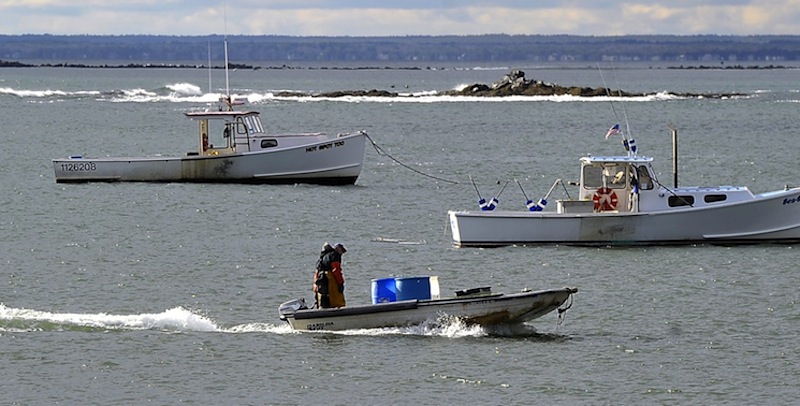AUGUSTA – A proposal to allow fishermen to keep and sell lobsters they scoop up in trawling nets has rekindled an old debate between those who hope to revive Maine’s groundfishing industry and lobstermen who guard the state’s most valuable fishery.
Sen. Anne Haskell, D-Portland, the sponsor of L.D. 1097, said the bill would permit trawlers to land “incidentally caught” lobsters, known as bycatch, in some federally regulated waters and sell them at the Portland Fish Exchange.
Haskell submitted a similar proposal in 2007. It was soundly defeated as lobstermen argued that drag gear indiscriminately harms lobsters and endangers the large females that are considered the lifeblood of the fishery.
On Monday, Haskell’s latest bill drew fierce opposition from lobstermen, who said at a public hearing that groundfish boats would target lobster, damage the product and undercut conservation efforts.
“I am deeply saddened to be here before you on this bill,” said David Cousens, president of the Maine Lobstermen’s Association. “Not only does this proposal seek to undo one of the pillars of lobster conservation, but this issue is divisive for Maine’s fishing industry.”
Still, the bill may have some momentum. The LePage administration is backing it, as is Portland Mayor Michael Brennan. Both argued Monday that the bill is a lifeline to the groundfish industry, which Haskell said is “hanging by a thread” because of reduced catch quotas imposed by the federal government.
Meredith Mendelson, deputy commissioner for the Department of Marine Resources, told lawmakers that lobsters are already being caught in federal waters, then landed and sold in other states. That includes Maine-based vessels that fish in three federally regulated zones and are allowed to land drag-caught lobsters.
Haskell’s bill would allow landings of drag-caught lobsters only from Area 3, a federally regulated zone that extends from Maine to the mid-Atlantic states and begins about 40 miles off the Maine coast. The bill includes measures to track the speed of boats to ensure that landings don’t come from Area 1 or Area 2, which are closer to shore.
Maine is the only New England state that prohibits sales of lobster bycatch from federally regulated waters.
Supporters of Haskell’s bill said the prohibition and the reduced groundfish catch limits threaten to eliminate Maine’s groundfish industry. They said fishermen have less incentive to stay here if they can’t sell their entire catch at Maine markets.
Mendelson said Maine ports are collapsing because of the situation while Massachusetts ports benefit from the economic activity associated with auctions of fish and sales of gear and fuel.
Similar arguments were made in 2007 in response to a study by the National Oceanic and Atmospheric Administration’s Northeast Fisheries Science Center in Woods Hole, Mass.
The study showed that Maine lost $9.6 million in seafood revenue to Massachusetts from 2000 to 2005 because of its law outlawing lobster landings.
No such study has been done since 2007, but NOAA’s science center noted a sharp decline in Maine-based groundfishing vessels in an annual assessment of the fishery, released in December. NOAA found that the number of Maine-based boats declined 23 percent, from 114 to 88, from 2009 to 2011. It was the largest decrease of any eastern state.
James Odlin, who owns and operates three groundfishing boats in Maine and two in Massachusetts, told lawmakers Monday that Maine’s fleet could shrink further if Haskell’s bill doesn’t pass.
Odlin said his fleet has unloaded 20 million pounds of groundfish in Gloucester, Mass., “that could have and should have landed in Maine.”
Odlin said narrow profit margins and the reduced groundfish catch make the lobster bycatch more critical than ever. He said he may have to move his entire operation to Massachusetts, after 45 years in Maine.
“This is an astounding outcome,” he said.
Lobstermen said the bill wouldn’t save the groundfish industry and could only hurt a lobster fishery that’s experiencing intense fishing pressure, depressed market prices and the northward spread of shell disease from southern New England.
Maine lobstermen landed 123 million pounds of lobsters in 2012, an increase of about 18 million pounds over 2011. Despite record landings, the market value has dropped.
The total value for landings in 2012 was $331 million, down by $3.7 million from 2011. Last year’s average price of $2.69 per pound was Maine’s lowest since 1994, and well below the $3.19 average of 2011, according to Department of Marine Resources reports.
Cousens, with the Maine Lobstermen’s Association, noted that groundfishermen in Massachusetts have been known to target large female lobsters, which are vital to the industry.
Massachusetts and other states allow groundfish boats to catch up to 100 lobsters per day, or up to 500 per five-day trip. Lobstermen say the quota should be by the pound to guard against taking large lobsters.
The point was reinforced by Bob Steneck, a professor in the University of Maine’s School of Marine Sciences. Steneck wrote in a report in 2011 that if lobster bycatch were allowed it could create a “perverse incentive for draggers to target large offshore lobsters.”
Diane Cowan, a scientist for The Lobster Conservancy, said the taking of large female lobsters could devastate the fishery.
The bycatch issue is sensitive. Over 400 people testified against Haskell’s bill during the 2007 public hearing held at the Augusta Civic Center.
Lobstermen unleashed a similarily intense lobbying effort in 2011 against former LePage administration Marine Resources Commissioner Norman Olsen. Olsen had made a public push to change the Maine bycatch law.
He later found himself at odds with LePage, whose office was innundated with phone calls, letters and emails from the lobster industry urging the administration to abandon changing the bycatch rules.
Olsen abruptly resigned in 2011 and blasted LePage in a highly publicized letter that was leaked to the media.
Steve Mistler can be contacted at 620-7016 or at:
smistler@pressherald.com
twitter.com/stevemistler
Send questions/comments to the editors.



Comments are no longer available on this story